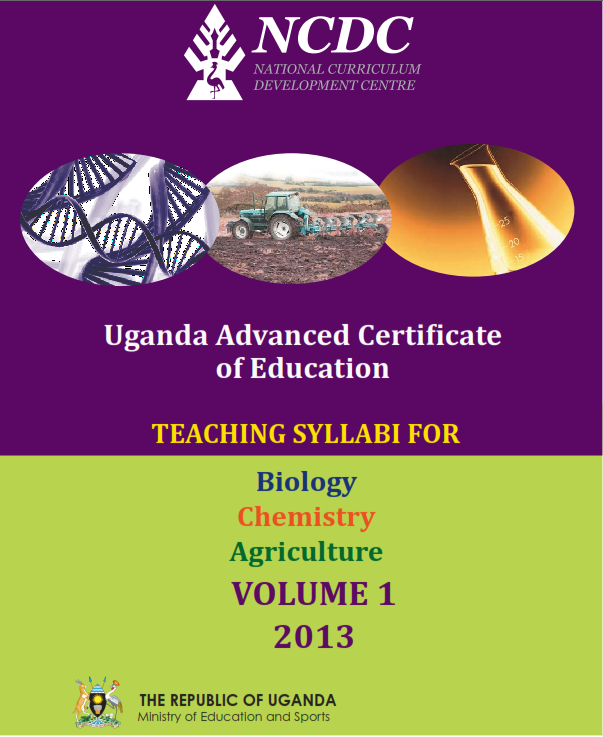

GENERAL INTRODUCTION
This volume of the Advanced Level syllabi contains three subjects: Agriculture, Biology and Chemistry. There are other volumes containing other Advanced Level subjects. The purpose of this merger is twofold. First, NCDC considered the content relatedness of the subjects and second, the need to avoid extremely
voluminous books.
These syllabi have been written in accordance with the National Objectives on Secondary Education. The syllabi content continues from that of the Ordinary Level curriculum. The syllabi have suggested a teaching order, teaching and learning strategies, and assessment strategies. In all cases the syllabi have tried as much as possible to integrate the theory and practicals. This means that the teaching and learning should be done through practical work as much as possible. The purpose is to make the learner acquire the necessary scientific skills.
The use of models or ICT opportunities should be exploited to help the learner visualise concepts which are rather hard or difficult to understand. The teachers are encouraged to help the learners acquire relevant mathematical skills so as to solve quantitative aspects of the subjects, including graphical methods and the use of logarithms.
The Agriculture syllabus has five topics: Basic Science, Crop Production, Animal Production, Agricultural Engineering and Farm Mechanisation and Economics. The topics have been coded “I” or “II”, etc in order to differentiate them from the O level syllabus content. These topics are meant to address crucial issues,
such as improved agriculture practices, new and appropriate crop and livestock technologies, high value crops, and practical skills.
The Biology syllabus comprises 14 topics: Cell Biology; Chemicals of Life; Cell Physiology; Levels of Organisation and Diversity of Life; Ecology; Inheritance and Evolution; Transport; Nutrition; Gaseous Exchange; Respiration; Homeostasis; Coordination; Support and Movement; and Reproduction,
Growth and Development. The syllabus places emphasis on understanding, application, analysis and evaluation of Biology concepts relating them to everyday experiences.
Download the Book below, by tapping on the link
https://www.ncdc.go.ug/resource-form-submissions/secondary-curriculum/a-level-curriculum/biology
The Chemistry syllabus has three main sections: Physical Chemistry, Inorganic Chemistry and Organic Chemistry. It is hoped that when teaching topics in the various sections, emphasis will be placed on the application of chemistry in East Africa, particularly in the industries and communities. The suggested teaching and learning strategies are meant to encourage understanding of the basics of chemical behaviour.
Are you in need of a new gambling game to pass the time? Do you…
ENFUMO ZA BUNYORO KITARA."""""""""""""""""""""""""""""""""""""""""""""""""""""" Ababiri bamira ebigambo, abasatu babisaturura Abagenda babiri baijukyangana Abaingi banobwa atubire…
You can download WAKISSHA JOINT MOCK EXAMINATION UACE 2024 AGRICULTURE PAPER 5152 marking guide Download…
You can access the Wakissha 2024 senior four mock exams question papers for different subjects…
The Uganda national Examinations Board (UNEB) has released the 2024 Primary Leaving Examinations, Uganda Certificate…
Download the exam Below 208_1_NLSC_Sample_24Download Download the Scoring / Marking Guide Here 208_1_NLSC_Sample_24_GuideDownload CLICK HERE…
Leave a Comment